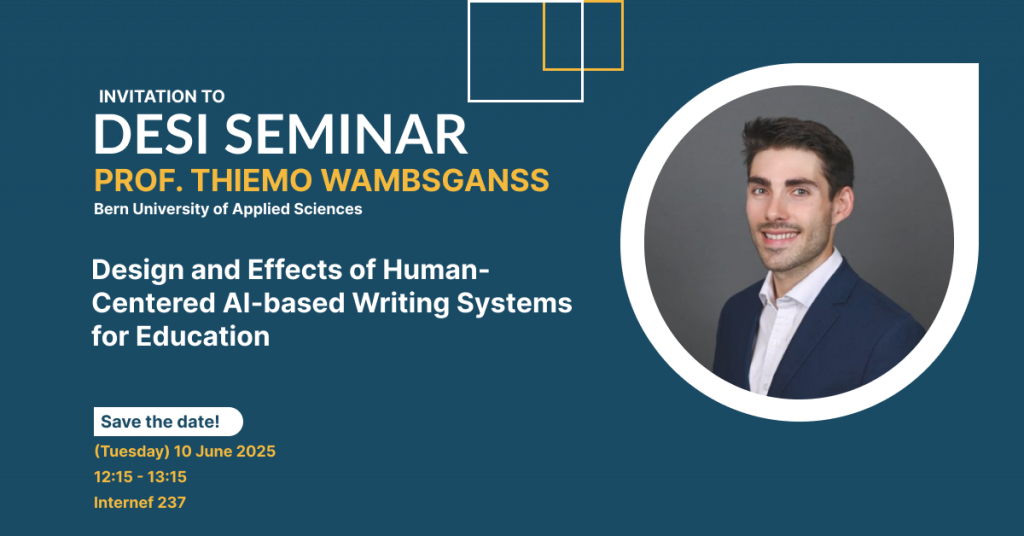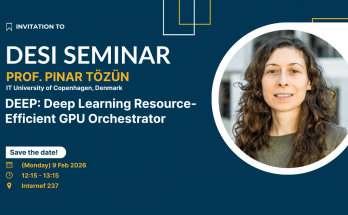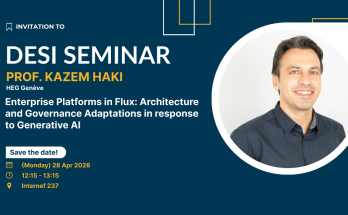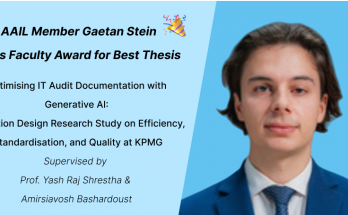
We are excited to announce that Prof. Thiemo Wambsganss from the Bern University of Applied Sciences, will be delivering a seminar on Design and Effects of Human-Centered AI-based Writing Systems for Education.
Abstract: In his talk, Dr. Thiemo Wamsbganss will present his research at the intersection of Human-Computer Interaction, Natural Language Processing, and Educational Technology on interactive writing assistants. In particular, he will present two projects: 1) his research on argumentation writing support systems for students to learn argumentation skills at scale with adaptive feedback and 2) his recent studies on conversational writing systems for reflective writing skills.
Argumentation is an omnipresent rudiment of daily communication and thinking. The ability to form convincing arguments is not only fundamental to persuading an audience of novel ideas but also plays a major role in strategic decision-making, negotiation, and constructive civil discourse. However, humans often struggle to develop argumentation skills owing to a lack of individual and instant feedback in their learning process since providing feedback on the individual argumentation skills of learners is time-consuming and not scalable if conducted manually by educators. Building on social cognitive theory, he investigates a set of theory-based design principles for a novel class of AI-based argumentation writing systems. The proposed systems provide learners with adaptive self-evaluation opportunities based on logical argumentation errors irrespective of instructor, time, and location. To evaluate the principles’ feasibility, he instantiates, develops, demonstrates, and evaluates his AI-based argumentation learning system ArgueLearn in a laboratory and field experiment. Based on this research, he followed up to investigate the potential of conversational tutoring and adaptive feedback for reflective writing of students and will present his latest research on a reflective writing system called MindBuddy, which was evaluated in two classroom studies with vocational students.
Short bio: Prof. Dr. Thiemo Wambsganss is a Tenure-Track Research Assistant Professor at Bern University of Applied Science in Bern, CH, and head of the Human-Centered AI-based Learning Systems (HAIS) Lab. His research lies in the general area of Human-Computer Interaction with influences from Natural Language Processing and Machine Learning, with a focus on educational systems.
He strives to understand how humans perceive, interact, and learn with intelligent tools to build and study innovative, human-centered learning systems that enhance (digital) education. Specifically, He is driven by the potential of advancements in Natural Language Processing, Machine Learning, and novel interfaces (e.g., AR/VR, conversational agents) to support key educational activities such as reading, writing, and assessment. To achieve this, he used advanced techniques such as Argumentation Mining, Empathy Modeling, and the integration of Large Language Models into adaptive learning tools. His research follows three connected main lines of work: 1) Designing and evaluating conversational agents and intelligent writing assistants to improve learning outcomes and engagement. 2) Developing adaptive, spatial, and interactive interfaces that personalize and scale learning experiences based on computational modeling. 3) Examining the ethical implications of AI-based learning tools, including trust in AI feedback, mitigation of bias, and value-sensitive (more information thiemowa.github.io).



